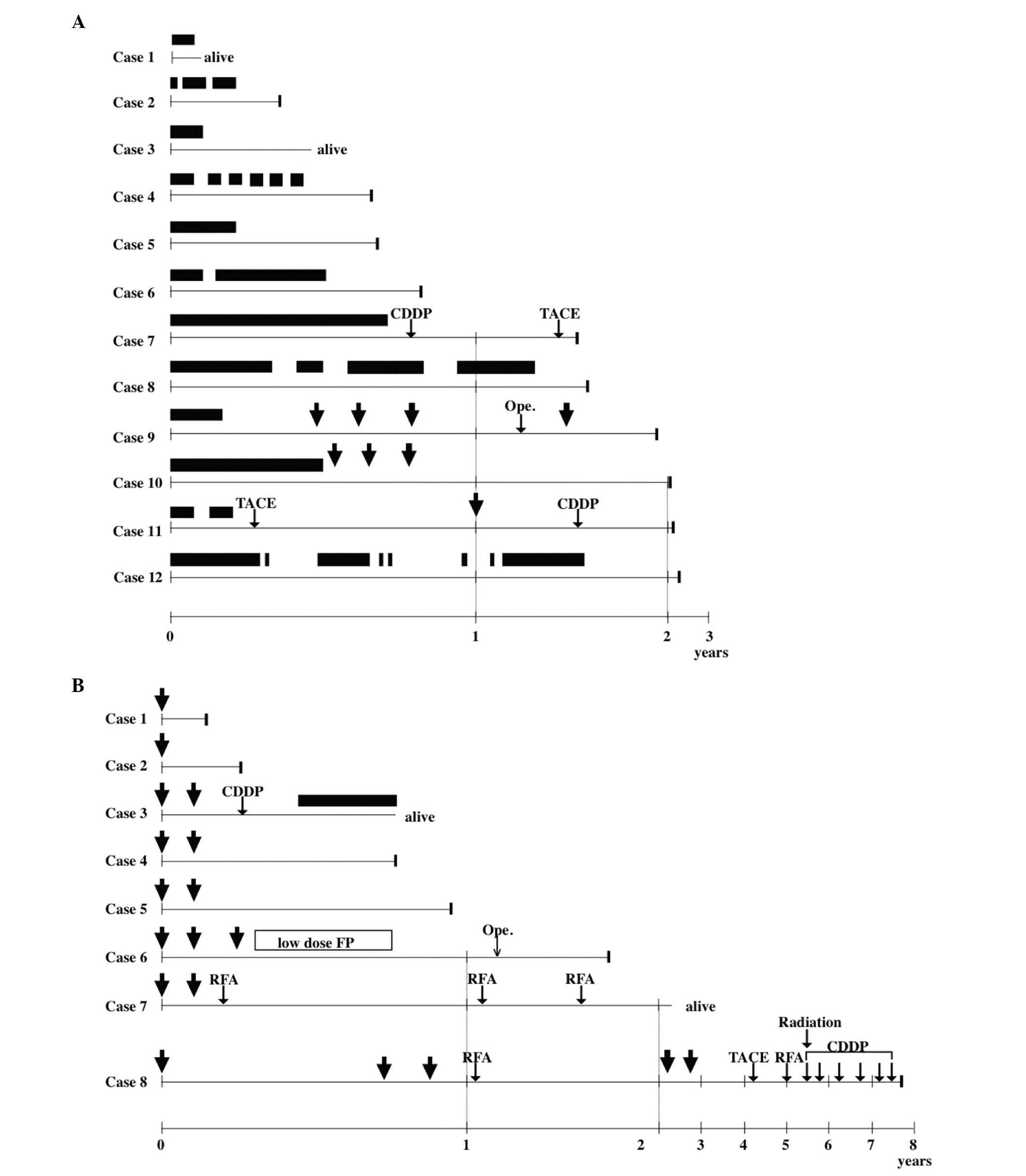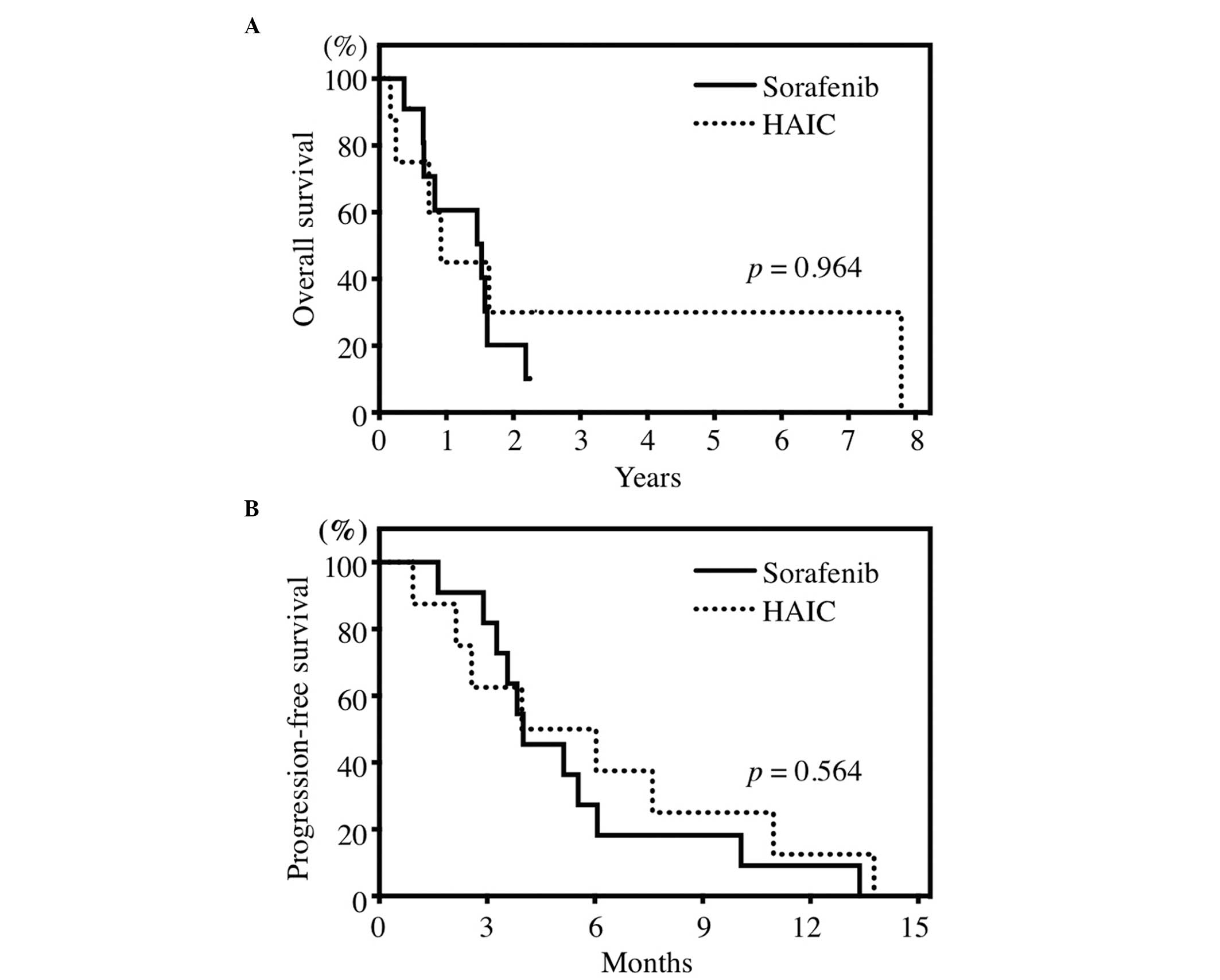|
1
|
El-Serag HB: Epidemiology of viral
hepatitis and hepatocellular carcinoma. Gastroenterology.
142:1264–1273. 2012. View Article : Google Scholar : PubMed/NCBI
|
|
2
|
Suda T, Nagashima A, Takahashi S, et al:
Active treatments are a rational approach for hepatocellular
carcinoma in elderly patients. World J Gastroenterol. 19:3831–3840.
2013. View Article : Google Scholar : PubMed/NCBI
|
|
3
|
Balducci L: Geriatric oncology: challenges
for the new century. Eur J Cancer. 36:1741–1754. 2000. View Article : Google Scholar : PubMed/NCBI
|
|
4
|
Collier JD, Curless R, Bassendine MF and
James OF: Clinical features and prognosis of hepatocellular
carcinoma in Britain in relation to age. Age Ageing. 23:22–27.
1994. View Article : Google Scholar : PubMed/NCBI
|
|
5
|
Mirici-Cappa F, Gramenzi A, Santi V, et
al: Treatments for hepatocellular carcinoma in elderly patients are
as effective as in younger patients: a 20-year multicentre
experience. Gut. 59:387–396. 2010.PubMed/NCBI
|
|
6
|
Llovet JM, Ricci S, Mazzaferro V, et al:
Sorafenib in advanced hepatocellular carcinoma. N Engl J Med.
359:378–390. 2008. View Article : Google Scholar : PubMed/NCBI
|
|
7
|
Kudo M, Izumi N, Kokudo N, et al; HCC
Expert Panel of Japan Society of Hepatology. Management of
hepatocellular carcinoma in Japan: Consensus-Based Clinical
Practice Guidelines proposed by the Japan Society of Hepatology
(JSH) 2010 updated version. Dig Dis. 29:339–364. 2011. View Article : Google Scholar
|
|
8
|
Meric F, Patt YZ, Curley SA, et al:
Surgery after downstaging of unresectable hepatic tumors with
intra-arterial chemotherapy. Ann Surg Oncol. 7:490–495. 2000.
View Article : Google Scholar : PubMed/NCBI
|
|
9
|
Miyaki D, Aikata H, Honda Y, et al:
Hepatic arterial infusion chemotherapy for advanced hepatocellular
carcinoma according to Child-Pugh classification. J Gastroenterol
Hepatol. 27:1850–1857. 2012. View Article : Google Scholar : PubMed/NCBI
|
|
10
|
Ando E, Tanaka M, Yamashita F, et al:
Hepatic arterial infusion chemotherapy for advanced hepatocellular
carcinoma with portal vein tumor thrombosis: analysis of 48 cases.
Cancer. 95:588–595. 2002. View Article : Google Scholar : PubMed/NCBI
|
|
11
|
Obi S, Yoshida H, Toune R, et al:
Combination therapy of intraarterial 5-fluorouracil and systemic
interferon-alpha for advanced hepatocellular carcinoma with portal
venous invasion. Cancer. 106:1990–1997. 2006. View Article : Google Scholar : PubMed/NCBI
|
|
12
|
Wong H, Tang YF, Yao TJ, et al: The
outcomes and safety of single-agent sorafenib in the treatment of
elderly patients with advanced hepatocellular carcinoma (HCC).
Oncologist. 16:1721–1728. 2011. View Article : Google Scholar : PubMed/NCBI
|
|
13
|
Morimoto M, Numata K, Kondo M, et al:
Higher discontinuation and lower survival rates are likely in
elderly Japanese patients with advanced hepatocellular carcinoma
receiving sorafenib. Hepatol Res. 41:296–302. 2011. View Article : Google Scholar
|
|
14
|
Di Costanzo GG, Tortora R, De Luca M, et
al: Impact of age on toxicity and efficacy of sorafenib-targeted
therapy in cirrhotic patients with hepatocellular carcinoma. Med
Oncol. 30:4462013.PubMed/NCBI
|
|
15
|
Montella L, Addeo R, Cennamo G, et al:
Sorafenib in elderly patients with advanced hepatocellular
carcinoma: a case series. Oncology. 84:265–272. 2013. View Article : Google Scholar : PubMed/NCBI
|
|
16
|
Jo M, Yasui K, Kirishima T, et al:
Efficacy and safety of sorafenib in very elderly patients aged 80
years and older with advanced hepatocellular carcinoma. Hepatol
Res. Feb 14–2014.(Epub ahead of print).
|
|
17
|
Yamashita T, Arai K, Sunagozaka H, et al:
Randomized, phase II study comparing interferon combined with
hepatic arterial infusion of fluorouracil plus cisplatin and
fluorouracil alone in patients with advanced hepatocellular
carcinoma. Oncology. 81:281–290. 2011. View Article : Google Scholar
|
|
18
|
Hiramine Y, Uto H, Imamura Y, et al:
Sorafenib and hepatic arterial infusion chemotherapy for
unresectable advanced hepatocellular carcinoma: A comparative
study. Exp Ther Med. 2:433–441. 2011.PubMed/NCBI
|
|
19
|
Jeong SW, Jang JY, Lee JE, et al: The
efficacy of hepatic arterial infusion chemotherapy as an
alternative to sorafenib in advanced hepatocellular carcinoma. Asia
Pac J Clin Oncol. 8:164–171. 2012. View Article : Google Scholar : PubMed/NCBI
|
|
20
|
Kasai K, Ushio A, Kasai Y, et al:
Therapeutic efficacy of combination therapy with intra-arterial
5-fluorouracil and systemic pegylated interferon alpha-2b for
advanced hepatocellular carcinoma with portal venous invasion.
Cancer. 118:3302–3310. 2012. View Article : Google Scholar
|
|
21
|
Enjoji M, Morizono S, Kotoh K, et al:
Re-evaluation of antitumor effects of combination chemotherapy with
interferon-alpha and 5-fluorouracil for advanced hepatocellular
carcinoma. World J Gastroenterol. 11:5685–5687. 2005.PubMed/NCBI
|
|
22
|
Ota H, Nagano H, Sakon M, et al: Treatment
of hepatocellular carcinoma with major portal vein thrombosis by
combined therapy with subcutaneous interferon-alpha and
intra-arterial 5-fluorouracil; role of type 1 interferon receptor
expression. Br J Cancer. 93:557–564. 2005. View Article : Google Scholar
|
|
23
|
Nagano H, Wada H, Kobayashi S, et al:
Long-term outcome of combined interferon-alpha and 5-fluorouracil
treatment for advanced hepatocellular carcinoma with major portal
vein thrombosis. Oncology. 80:63–69. 2011. View Article : Google Scholar
|
|
24
|
Uka K, Aikata H, Takaki S, et al:
Pretreatment predictor of response, time to progression, and
survival to intraarterial 5-fluorouracil/interferon combination
therapy in patients with advanced hepatocellular carcinoma. J
Gastroenterol. 42:845–853. 2007. View Article : Google Scholar
|
|
25
|
Cheng AL, Kang YK, Chen Z, et al: Efficacy
and safety of sorafenib in patients in the Asia-Pacific region with
advanced hepatocellular carcinoma: a phase III randomised,
double-blind, placebo-controlled trial. Lancet Oncol. 10:25–34.
2009. View Article : Google Scholar
|
















